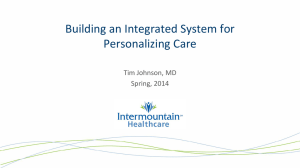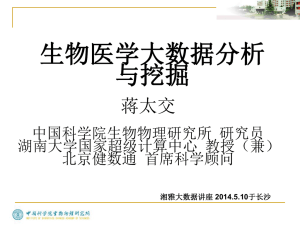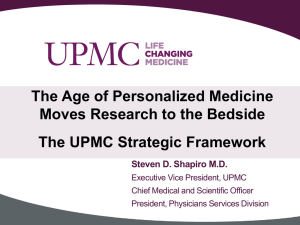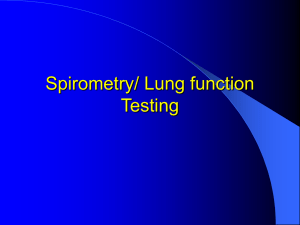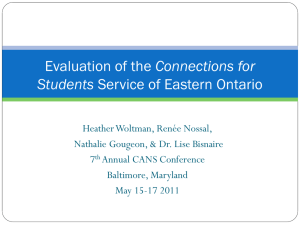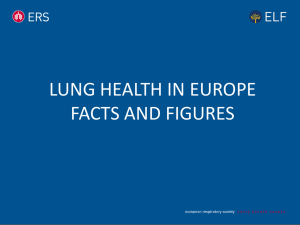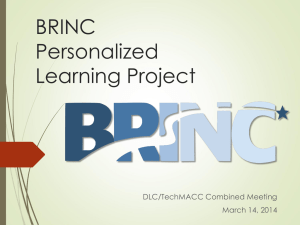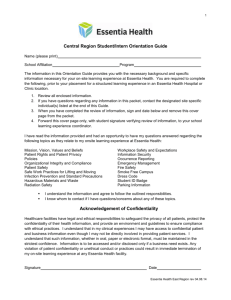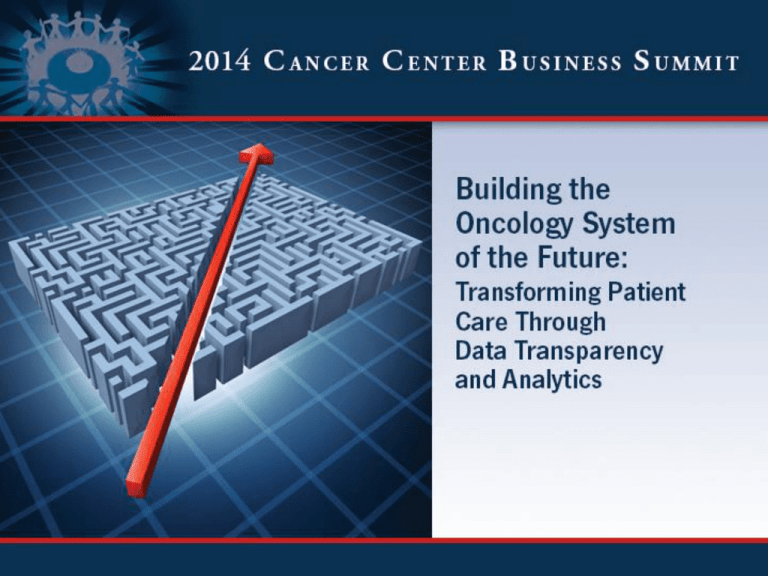
The Role of Personalized Medicine in our
Future Delivery System
Moderator: Edward Abrahams, Ph.D.,
President, Personalized Medicine Coalition
Panelists:
Christine Cournoyer, Chief Executive Officer, Nof-One
Maurie Markman, M.D., Senior Vice President
for Clinical Affairs, Cancer Treatment Centers of
America
Catherine A. McCarty, Ph.D., MPH, Principal
Research Scientist, Essentia Health
David Nixon, Chief Executive Officer,
InformedDNA
Timothy Thompson, Chief Executive Officer,
Intervention Insights
The Role of Personalized
Medicine in our Future Delivery
System
Christine Cournoyer,
Chief Executive Officer, N-of-One
Challenges
• NCCN Guidelines address the treatment needs of limited number of
patients
• Knowledge of additional markers and therapies isn’t readily available to
the physician at the point of care
• Reimbursement for additional testing and therapies is a key challenge
• Access to the drugs and clinical trials can be time consuming and difficult
Broader testing and guided therapy can offer improved alternatives to
cancer patients failing the standard of care
Evidence to support exploration of additional therapies
• Both the literature and N-of-One experience reflect the high percentage
of actionable biomarkers that are not included in NCCN guidelines.
• Expanded testing and clinical interpretation of results can guide
physicians to more biomarker-directed therapies
• Larger patient studies are beginning to support improved clinical
outcome of individualized strategies based on molecular test results for
cancer treatment
Integration of more molecular testing could transform individualized
cancer care.
Lung adenocarcinoma as an example of the need for
expanded testing and personalized cancer care
• NCCN Guidelines impact only about 14% of Caucasians who test
positive for EGFR (10-15%) and ALK (4%) leaving a large population of
lung cancer patients (~80%) without access to targeted therapy options.
Does this matter?
• A growing number of studies, N-of-One data and patient cases in lung
cancer support the premise that access to additional targeted therapies
beyond the NCCN guidelines may lead to improved outcomes.
Lung Cancer Mutation Consortium Protocol: evidence for biomarkerdirected therapy in lung cancer
Oncogenic drivers were identified in 466 of 733 patients
tested for 10 biomarkers (64%) from 2009-2012.
(KRAS, EGFR, ALK, ERBB2, BRAF, PIK3CA, MET, NRAS, MEK, AKT1)
Oncogenic drivers were identified in 578 of 938 patients
tested for at least 1 biomarker (62%).
260 with
actionable
biomarker
318 with
actionable
biomarker
Biomarkerdirected
therapy
No biomarkerdirected
therapy
3.5 yr median
survival
2.4 yr median
survival
p=0.006
Kris et al, JAMA May 2014
N-of-One Data collected over a 1-year period supports biomarker
testing in lung adenocarcinoma
Clinical actionability in lung adenocarcinoma
(n=211)
% Patients with actionability level
60
Patient Excluding EGFR and ALK positive
50
40
30
20
10
0
A
B
Legend: A = drug available on-label
C = clinical trial available
C
D
B = drug available off-label
D = not actionable
New Models Emerging to bring Precision Medicine to the Community:
Example: Intermountain Personalized Medicine Clinic
• Intermountain, with the help of N-of-One, can offer physicians
consulting on the appropriate use of molecular testing to guide
additional diagnostic testing with evidence to support reimbursement
• Intermountain will provide the testing and clinical interpretation and
present the results to their Molecular Tumor Board (MTB) for discussion
• Intermountain’s MTB can provide an analysis of the results and
knowledge of available targeted therapies indicated for any actionable
mutations.
• Intermountain can work with the patient on reimbursement and can
provide drug procurement of the targeted therapy for the patient
Benefit: Patient receives precision medicine options in their
community
The Role of Personalized
Medicine in our Future
Delivery System
Catherine A. McCarty, Ph.D.,
MPH, Principal Research
Scientist, Essentia Health
Personalized Medicine Within Research
Networks and in Rural America
• Challenges
• Opportunities
• Cathy McCarty, PhD, MPH
• Essentia Institute of Rural Health
Essentia Health Care Delivery System
NCI Community Oncology Research Program
HMO Research Network Cancer Research
Network
Common Challenges
• Electronic health record usability and interoperability
– Data storage
– Decision support
– Data portability
• Reimbursement
• Models for return of results
The Role of Personalized
Medicine in our Future
Delivery System
Maurie Markman, M.D., Senior
Vice President for Clinical Affairs,
Cancer Treatment Centers of
America
“Precision Medicine”
“The Future of Cancer Care”
Maurie Markman, M.D.
President, CTCA Medicine & Science
Clinical Professor of Medicine, Drexel University College of Medicine
“Targeted”, “Personalized”, or
(most recently) “Precision” therapy
• Not a new concept
• Hormonal therapy of breast/prostate cancer:
Earliest systemic anti-neoplastic strategy
ER receptor discovered 40 years ago
• HER-2 over-expression in breast cancer
• CML/GIST (profoundly different pathology but
similar molecular abnormalities resulting in
essentially identical highly effective therapy)
• Resulting over-simplification of complex biology
18
© 2011 Rising Tide
“The difficult path forward …..”
• Inhibition of EGFR in lung cancer – unique
mutation vs. simple over-expression
• Inhibition of EGRF in colon cancer – role of
KRAS mutation defining lack of utility
• Small patient subsets – Difficulty proving clinical
benefit, including for regulatory approval
• Evidence required for molecular markers
• Insurers willingness to pay
19
© 2011 Rising Tide
But ….
• The future is here
• It is possible today to sequence the entire
genome of a tumor and the corresponding
normal genome (pharmacogenomics) of an
individual cancer patient for < $5,000 (12-15
years ago this would have cost $6,000,000,000)
• So, the issue is not whether the data will be
available to patients, but rather how to
optimally convert this massive quantity of
raw data into information of genuine value in
individual patient management
20
© 2011 Rising Tide
Declining Cost of
Sequencing a Human Genome
21
© 2011 Rising Tide
“The STEPS”
• Discovering the “code” in an individual patient–
(“sequencing”) (easy)
• Attempting to break the “code” – (“bioinformatics) (difficult - extremely difficult)
• Exploring the relevance of the proposed solution
(“clinical validation with a targeted therapeutic”)
in individual patients (unknown difficulty)
• Proving the relevance of the solution (“n of one”
research) (soon-to-be the new paradigm in
clinical cancer therapeutic research)
22
© 2011 Rising Tide
Pharmacogenomics in Cancer
Management
• Well-recognized variations in the severity of
toxicities of anti-neoplastic agents between
individuals and ethnic groups impacting:
• (1) quality of life;
• (2) survival outcomes (ability to deliver a
sufficient concentration and total dose over time
to produce the desired/optimal cytotoxic effect)
23
© 2011 Rising Tide
Proposed future research strategy
• Web-based national/international registry of
outcomes (history, validated treatment results)
from therapy based on molecular-based
management – (“n-of-one” research)
(“CancerLinQ”– ASCO (Schilsky; Nat. Rev. Clin. Oncol.) )
• Results made available to all interested parties
(public, patients, regulatory agencies, 3rd party
payers, employers, research community)
• When robust data available, publication in peerreviewed literature
24
© 2011 Rising Tide
The Role of Personalized
Medicine in our Future
Delivery System
David Nixon, Chief Executive
Officer, InformedDNA
The Role of Personalized
Medicine in our Future Delivery
System
Timothy J. Thompson,
CEO, Intervention Insights
Molecular Testing & Implications for
the Care Delivery Model in Oncology
Marker Panel
Care Setting
Evidentiary
Standard
Routine
Clinical Care
Clinical Trial
Referral
Research
(Trial & Error)
• Clinical utility has
been established in
published literature
• Clinical research
program established
with clearly defined
end points
• Clinical utility has not
been established.
• Pre-clinical, biologic
plausibility data
• Payer covers cost
of routine care
• Study Sponsor
covers cost of
study-related care
• Industry Funding?
• Government/Grant
funding?
• Payer
Funding
Considerations Reimbursement for
total cost of care
• Marker panel to
Other
considerations expand based
upon evolving
medical evidence
© 2014 Intervention Insights. All Rights Reserved.
• Master protocol
• Informed consent
• Structured data
capture with a plan
to publish

